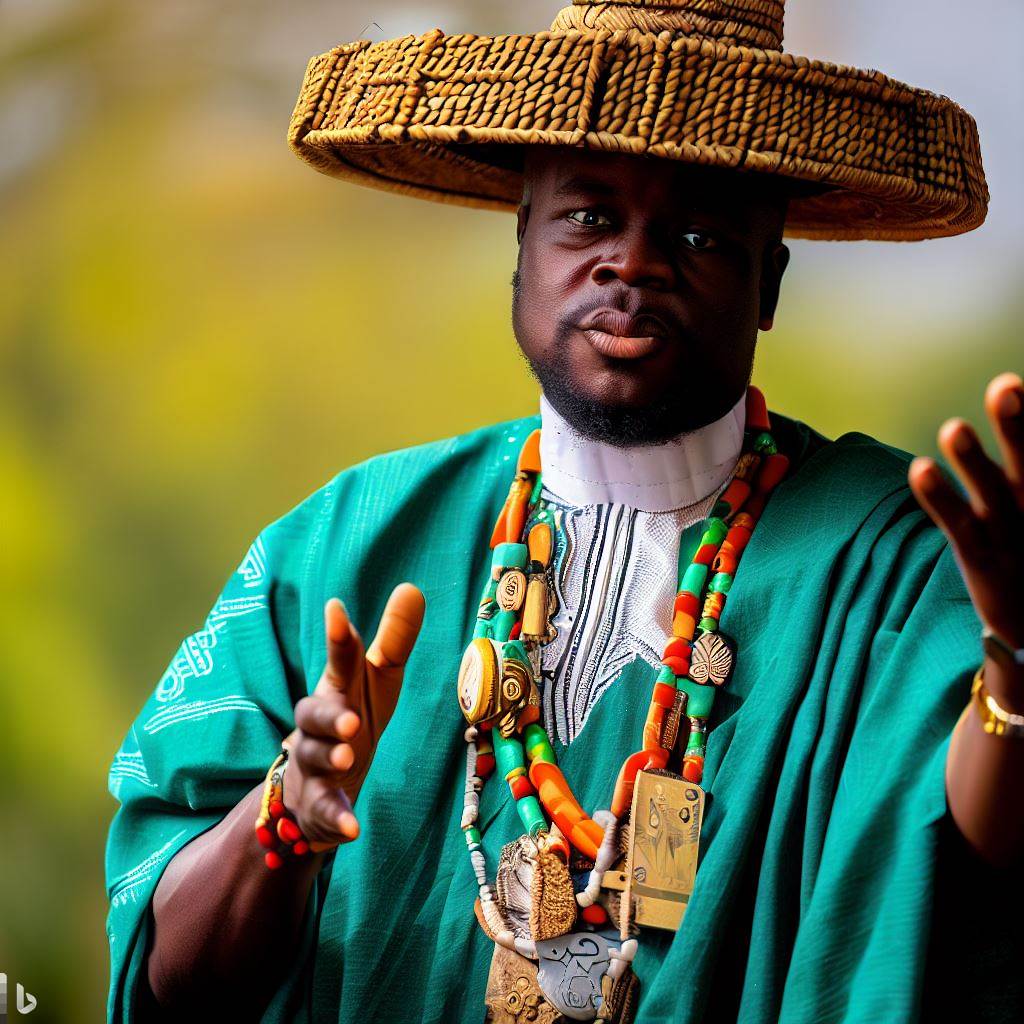Introduction
Culture Role is an integral part of Nigeria tour guiding profession. The profession revolves around showcasing the diverse traditions, customs, and history of this vibrant West African nation.
Nigeria, known for its rich cultural heritage, offers a unique experience for both local and international tourists.
Nigeria’s cultural diversity is one of its major attractions. The country is home to more than 250 ethnic groups, each with its own distinct traditions, languages, art forms, and festivals.
Tour guides play a crucial role in bringing these cultural elements to life for visitors, providing them with a deeper understanding and appreciation of Nigeria’s cultural wealth.
The role of culture in Nigeria’s tour guiding profession goes beyond mere entertainment for tourists. It serves as a means of preserving and promoting the country’s cultural heritage.
By showcasing Nigerian culture to both locals and international visitors, tour guides contribute to the preservation of traditional customs, rituals, and art forms that might otherwise be forgotten.
Furthermore, culture enriches the overall tourist experience.
Tourists have the opportunity to immerse themselves in the local way of life, interact with locals, taste traditional cuisine, witness vibrant festivals, and appreciate indigenous art and crafts.
This cultural immersion adds depth and authenticity to their travel experiences, leaving them with lasting memories of Nigeria’s unique cultural tapestry.
In fact, the role of culture in Nigeria’s tour guiding profession is of utmost importance.
It not only showcases the country’s rich cultural heritage but also contributes to its preservation and offers a deeper, more immersive experience for both locals and tourists.
Nigeria’s tour guides serve as cultural ambassadors, creating a bridge between the past and the present, and ensuring the continuation of Nigeria’s vibrant cultural traditions.
Understanding Nigeria’s Tour Guiding Profession
Define the tour guiding profession in Nigeria
- Tour guiding is a profession that involves providing assistance, information, and interpretation to visitors.
- In Nigeria, tour guides are responsible for guiding tourists and showcasing the country’s attractions.
- They play a vital role in bridging the gap between tourists and Nigeria’s rich cultural heritage.
Outline the responsibilities and qualifications of a tour guide in Nigeria
- A tour guide in Nigeria is responsible for conducting tours, ensuring visitor safety, and providing information.
- They must have extensive knowledge about Nigeria’s history, culture, traditions, and tourist destinations.
- Qualifications include excellent communication skills, a friendly demeanor, and fluency in multiple languages.
- They should also possess organizational and problem-solving abilities to handle unexpected situations.
Highlight the importance of tour guiding in promoting tourism and preserving cultural heritage
- Tour guiding plays a crucial role in promoting tourism in Nigeria and attracting both domestic and international visitors.
- Guides act as ambassadors, showcasing the unique cultural heritage of the country.
- They provide valuable insights, making the tourists’ experience more meaningful and engaging.
- Tourism revenue generated through guided tours contributes to the preservation of cultural heritage sites.
- Tour guides ensure that visitors respect and appreciate Nigeria’s cultural norms and practices.
- By educating tourists about Nigeria’s diverse culture, tour guides help promote tolerance and mutual understanding.
- Guides also facilitate the exchange of ideas and knowledge between tourists and local communities.
- They encourage sustainable tourism practices, such as responsible travel and conservation efforts.
In short, the tour guiding profession in Nigeria plays a significant role in the promotion of tourism and preservation of the country’s cultural heritage.
Tour guides act as ambassadors, providing visitors with valuable insights and ensuring their safety and satisfaction.
Their extensive knowledge, excellent communication skills, and ability to bridge cultural gaps make their role indispensable in the tourism industry.
As Nigeria continues to develop as a top tourist destination, the tour guiding profession will continue to be vital in enhancing the overall visitor experience and fostering cultural exchange.
Exploring Nigeria’s Cultural Diversity
In Nigeria, the tourism industry is greatly influenced by the country’s rich cultural diversity.
The various ethnic groups in Nigeria contribute to the cultural tapestry of the nation, attracting tourists from all over the world.
The Various Ethnic Groups and their Unique Cultures in Nigeria
- The Hausa-Fulani: Known for their vibrant traditional attires, Hausa-Fulani people have a strong Islamic influence in their culture.
- The Yoruba: Yoruba ethnic group is renowned for its artistic heritage, including intricate beadwork, impressive wood carvings, and colorful festivals.
- The Igbo: Igbo culture is marked by their masquerades, rich folklore, and traditional music, which plays a significant role in their ceremonies and events.
- The Ijaw: With a strong connection to water, the Ijaw people are known for their fishing, boat-making skills, and cultural festivals like the famous Odi-Ogor festival.
- The Efik/Ibibio: These groups are known for their delicious cuisine, traditional dance forms like Ekombi, and colorful cultural festivals such as the New Yam festival.
Each ethnic group in Nigeria has its unique cultural practices, languages, and customs that tourists find fascinating and attractive.
The Role of Cultural Diversity in Attracting Tourists
Culture Role is an integral part of Nigeria tour guiding profession. Cultural diversity serves as a major attraction for tourists in Nigeria.
Travelers are drawn to the opportunity to experience and immerse themselves in different cultural practices, festivals, and traditions.
By showcasing the variety of cultures Nigeria has to offer, the tour guiding profession plays a crucial role in enticing tourists to explore the country.
Furthermore, cultural diversity in Nigeria provides a wide range of tourism activities, from visiting historical sites and museums to attending cultural festivals and events.
Tourists can engage in activities like learning traditional dances, trying local cuisines, and participating in indigenous rituals, creating unforgettable memories.
The Significance of Preserving and Promoting Cultural Heritage in Nigeria’s Tour Guiding Profession
Culture Role is an integral part of Nigeria tour guiding profession. Preserving and promoting cultural heritage is paramount in Nigeria’s tour guiding profession.
By doing so, the nation can ensure the sustainability and continued appreciation of its diverse cultures, positively impacting the tourism industry.
When cultural heritage is preserved and promoted, it not only leads to increased tourism but also enhances national unity and identity.
Nigeria’s cultural diversity is a source of pride for its citizens, and promoting cultural heritage fosters a sense of belonging and shared values among the population.
Additionally, preserving cultural heritage contributes to the socio-economic development of local communities.
Cultural tourism generates income and job opportunities for artisans, performers, and local businesses.
It also encourages the development of infrastructure and services in regions with significant cultural sites, leading to overall economic growth.
In general, Nigeria’s cultural diversity plays a vital role in the tour guiding profession.
The unique traditions, customs, and practices of various ethnic groups in Nigeria attract tourists, offering them the opportunity to experience and appreciate the country’s rich cultural heritage.
By preserving and promoting cultural heritage, Nigeria can harness the potential of its diverse cultures, stimulating tourism, national unity, and economic development.
Read: Casino Host Salaries in Nigeria: What to Expect in 2023
Interactions with Local Communities
Describe how tour guides in Nigeria engage with local communities
Tour guides in Nigeria engage with local communities by fostering relationships and active participation in their culture.
They organize cultural events, visit local markets, and encourage tourists to interact with locals.
Discuss the importance of understanding local customs, traditions, and norms
Understanding local customs, traditions, and norms is crucial for tour guides in Nigeria as it allows them to offer authentic experiences to tourists.
It helps in avoiding cultural misunderstandings or offenses and promotes respect for the local culture.
Highlight the role of tour guides as cultural ambassadors, bridging the gap between tourists and locals
Culture Role is an integral part of Nigeria tour guiding profession.
Tour guides in Nigeria are cultural ambassadors, fostering intercultural understanding and connecting tourists with local communities.
They facilitate communication, elucidate customs, and bridge cultural gaps.
Engagement with local communities is pivotal in this profession. Tour guides offer deeper insights into Nigeria’s culture, traditions, and way of life by actively involving tourists in local experiences.
They arrange community visits, allowing tourists to immerse themselves in daily life, music, dance, and art forms. These interactions foster cultural exchange and a better understanding of the local culture.
Understanding local customs, etiquette, and norms is paramount. Tour guides ensure respectful and enjoyable visits by interpreting gestures, clothing, and rituals accurately.
They serve as intermediaries, bridging language and cultural barriers, explaining local practices, and enabling meaningful interactions.
Tour guides act as cultural ambassadors, showcasing Nigeria’s rich history, arts, and traditions through storytelling, tours, and performances, promoting appreciation and respect among tourists.
By building relationships with local communities, they promote sustainable tourism by supporting local businesses.
Tourists gain a deeper cultural understanding and contribute positively to visited communities.
In essence, Nigeria’s tour guides promote cultural exchange, understanding, and sustainable tourism.
They act as cultural ambassadors, ensuring authentic experiences while connecting tourists and locals, enhancing appreciation for the country’s diverse cultures.
Read: Top Tourist Destinations in Nigeria: A Guide’s Perspective

Cultural Immersion and Experiences
The Role of Culture in Offering Immersive Experiences for Tourists
Culture Role is an integral part of Nigeria tour guiding profession.
Culture plays a crucial role in providing immersive experiences for tourists as it allows them to fully engage with the local way of life and traditions.
Traditional Festivals, Music, Dance, and Cuisine as Cultural Attractions
Traditional festivals, music, dance, and cuisine serve as significant cultural attractions in Nigeria, showcasing the rich heritage and diversity of the country.
The Impact of Cultural Immersion on Tourists’ Understanding and Appreciation of Nigeria
To excel as a tour guide in Nigeria, comprehensive research is your foundation.
Understanding Nigeria’s history, culture, and attractions is not only vital for your expertise but also enriches tourists’ experiences.
Nigeria’s rich history allows you to contextualize landmarks, from the Benin Kingdom to colonialism’s impact, adding depth to your tours.
This historical insight also enhances your ability to address tourists’ questions.
Nigeria’s diverse culture is a treasure trove. Showcasing traditions like Yoruba festivals and Igbo masquerades enriches tourists’ appreciation of the country.
Immersing yourself in local customs elevates their understanding of Nigeria’s heritage.
In creating enticing itineraries, knowing Nigeria’s attractions is essential. From Lagos’ beautiful beaches to Jos Plateau’s breathtaking landscapes, recommend these wonders for unforgettable experiences and positive word-of-mouth.
To conduct thorough research, consult travel books, documentaries like the BBC’s “Journey to Nigeria,” and reliable websites like Visit Nigeria.
Connect with local contacts, including historians, academics, and tour operators, for invaluable insights and hidden gems.
Basically, extensive research and cultural immersion are fundamental for tour guides in Nigeria.
This knowledge brings depth, authenticity, and enthusiasm to your tours, ensuring unforgettable experiences for tourists.
Read: Tour Guide Salary in Nigeria: Expectations and Realities
Overcoming Challenges and Stereotypes
Identify common stereotypes and misconceptions about Nigeria and its culture
- Nigeria is often associated with corruption, violence, and instability.
- People believe that Nigerians are uneducated and lacking in technological advancements.
- Many assume that Nigeria is a homogeneous country with a single culture.
Discuss how tour guides can address and debunk these stereotypes through cultural education
Tour guides have a crucial role in dispelling stereotypes and providing accurate cultural information. Here’s how:
- Provide historical context: Tour guides can explain the complexities of Nigeria’s history to challenge the perception of instability.
- Showcase diversity: By highlighting Nigeria’s diverse ethnic groups and cultures, tour guides can debunk the notion of homogeneity.
- Share success stories: Sharing stories of successful Nigerians in various fields can challenge the misconception of lack of education and progress.
- Highlight technological advancements: Emphasizing Nigeria’s tech industry and achievements can counter the stereotype of technological backwardness.
- Encourage interaction: Engaging tourists in cultural activities and interactions with locals can break down stereotypes and foster understanding.
Highlight the importance of accurate representation and cultural sensitivity in tour guiding
Accurate representation and cultural sensitivity are essential in the tour guiding profession.
Here’s why:
- Promoting positive image: By providing accurate information, tour guides contribute to presenting a more balanced and positive image of Nigeria.
- Respecting cultural norms: Being culturally sensitive helps tour guides avoid offending locals and fosters harmonious interactions.
- Preserving cultural heritage: Educating tourists about the importance of preserving Nigeria’s cultural heritage ensures its long-term sustainability.
- Fostering mutual respect: Promoting cultural understanding helps bridge the gap between tourists and locals, fostering mutual respect and appreciation.
- Building a sustainable tourism industry: By addressing stereotypes and misconceptions, tour guides contribute to the growth of the tourism sector in Nigeria.
- Enhancing visitor experience: Providing accurate cultural insights enhances the overall satisfaction and enjoyment of tourists’ experience.
Generally, overcoming challenges and stereotypes in Nigeria’s tour guiding profession requires proactive efforts from tour guides.
By addressing stereotypes, such as corruption and lack of education, through cultural education, they can provide visitors with a more accurate and nuanced understanding of Nigeria.
Additionally, emphasizing the importance of accurate representation and cultural sensitivity contributes to promoting a positive image, preserving cultural heritage, and fostering mutual respect.
Ultimately, these efforts contribute to building a sustainable and thriving tourism industry in Nigeria.
Read: How to Excel as a Tour Guide in Nigeria: Essential Skills
See Related Content: Connecting with Event Manager Networks in Nigeria
Harnessing the Economic Potential
Discuss the economic benefits of Nigeria’s tour guiding profession
- Nigeria’s tour guiding profession brings substantial economic benefits to the country.
- It creates employment opportunities for local communities and helps reduce unemployment rates.
- Tour guides earn income through their services, contributing to the growth of the local economy.
- The profession also generates revenue through the sale of tour packages, accommodations, and transportation services.
- Nigeria’s rich cultural heritage attracts tourists, boosting the demand for tour guiding services.
- The economic benefits extend beyond the tour guides themselves, reaching other sectors such as hospitality, transportation, and local businesses.
Analyze the potential of cultural tourism for economic growth in Nigeria
- Cultural tourism has immense potential for driving economic growth in Nigeria.
- The country’s diverse cultural heritage serves as a unique selling point for attracting tourists.
- Cultural tourism promotes community development by creating opportunities for local artisans and craftsmen.
- It encourages investment in infrastructure development to cater to the needs of tourists.
- The revenue generated from cultural tourism can be reinvested in other sectors, further stimulating economic growth.
- Cultural tourism also helps preserve and promote Nigeria’s cultural traditions, supporting sustainable development.
Share success stories of individuals contributing to the development of cultural tourism in Nigeria
- Femi Adeyemi, a tour guide, started his own tour company, showcasing Nigeria’s cultural landmarks and traditions.
- Adeyemi’s initiative has not only provided employment to locals but has also bolstered the local economy.
- Aisha Ibrahim, a young entrepreneur, established a cultural tourism center in a rural village.
- The center offers immersive experiences, allowing tourists to engage with local communities.
- Ibrahim’s project has revitalized the village’s economy, creating opportunities for residents to showcase their cultural practices.
- Chinedu Eze, an acclaimed photographer, travels across Nigeria capturing stunning cultural landscapes.
- Eze’s photographs have attracted international recognition, attracting tourists from around the world.
- His work has not only boosted cultural tourism but also created a platform for local artists to showcase their talents.
All in all, Nigeria’s tour guiding profession and cultural tourism have immense economic potential.
The profession contributes to employment generation, revenue generation, and overall economic growth.
Cultural tourism, with its sustainable and community-driven approach, can unlock significant opportunities for Nigeria’s economic development.
Numerous success stories of individuals contributing to the development of cultural tourism serve as inspiration and demonstrate the sector’s potential for driving economic growth.
Conclusion
Recap the role of culture in Nigeria’s tour guiding profession
Culture plays a significant role in Nigeria tour guiding profession by providing a unique selling point for tourism.
It encompasses the traditions, beliefs, customs, and practices of the Nigerian people, which attract tourists.
Emphasize the importance of cultural preservation and representation
Preserving and representing Nigeria’s culture is crucial in maintaining the authenticity of the tour guiding profession.
It allows tourists to experience the rich heritage, diverse languages, vibrant music, and captivating arts of the country.
Conclude with a call to action to promote cultural tourism and appreciation in Nigeria
To ensure the growth and sustainability of Nigeria’s tour guiding profession, there is a need for collective efforts to promote cultural tourism and appreciation.
This could be achieved through the development of cultural awareness programs, collaborations with local communities, and government support.
In the end, Nigeria’s tour guiding profession relies heavily on the richness and authenticity of its culture.
Publish Your Professional Profile, Business or Brand
Showcase your expertise, gain trust, and boost visibility instantly on Professions.ng.
Publish NowPreserving and representing this culture is essential for attracting tourists and ensuring the sustainable growth of the industry.
It is crucial for Nigeria to actively promote cultural tourism and appreciation to showcase its unique heritage to the world.
Together, we can create a thriving tour guiding profession that celebrates and preserves Nigeria’s diverse cultural identity.




